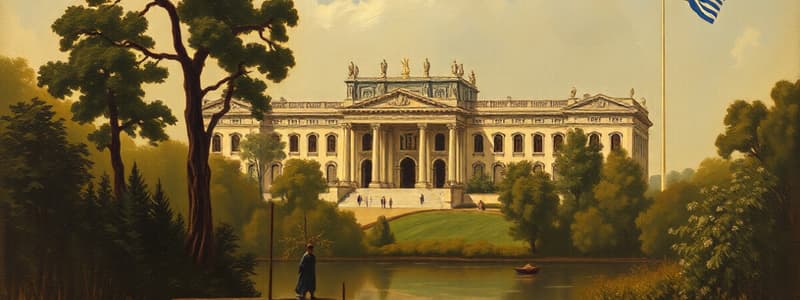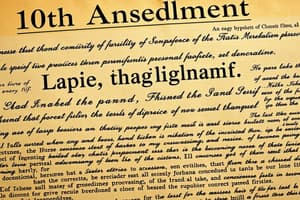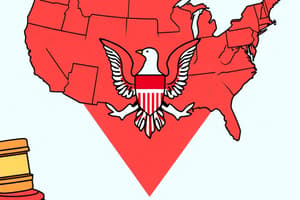Podcast
Questions and Answers
Which amendment is primarily concerned with protecting the interests of various groups, including political parties and lobbying organizations?
Which amendment is primarily concerned with protecting the interests of various groups, including political parties and lobbying organizations?
What type of federalism is characterized by cooperative governance and is often preferred by Democrats?
What type of federalism is characterized by cooperative governance and is often preferred by Democrats?
What significant legal principle did the case Schenck v. United States establish?
What significant legal principle did the case Schenck v. United States establish?
Which case established that states are required to provide an attorney to defendants who cannot afford one?
Which case established that states are required to provide an attorney to defendants who cannot afford one?
Signup and view all the answers
Which of the following is NOT a method by which police can conduct searches?
Which of the following is NOT a method by which police can conduct searches?
Signup and view all the answers
The Establishment Clause of the 1st Amendment seeks to achieve what?
The Establishment Clause of the 1st Amendment seeks to achieve what?
Signup and view all the answers
Which of the following best describes the implications of the 14th Amendment's due process clause?
Which of the following best describes the implications of the 14th Amendment's due process clause?
Signup and view all the answers
What was the main outcome of Brown v. Board of Education?
What was the main outcome of Brown v. Board of Education?
Signup and view all the answers
Which amendment abolished poll taxes for voting in federal elections?
Which amendment abolished poll taxes for voting in federal elections?
Signup and view all the answers
What is the primary role of the Vice President in the Senate?
What is the primary role of the Vice President in the Senate?
Signup and view all the answers
What defines the concept of gerrymandering?
What defines the concept of gerrymandering?
Signup and view all the answers
Which body of Congress has the exclusive power to introduce revenue bills?
Which body of Congress has the exclusive power to introduce revenue bills?
Signup and view all the answers
Which type of jurisdiction allows a court to hear a case for the first time?
Which type of jurisdiction allows a court to hear a case for the first time?
Signup and view all the answers
What is 'log rolling' in the context of Congress?
What is 'log rolling' in the context of Congress?
Signup and view all the answers
Which of the following is considered a concurrent power?
Which of the following is considered a concurrent power?
Signup and view all the answers
What is the main function of the Federal Reserve Board?
What is the main function of the Federal Reserve Board?
Signup and view all the answers
What effect does a pocket veto have?
What effect does a pocket veto have?
Signup and view all the answers
Which amendment grants Washington D.C. electoral votes in presidential elections?
Which amendment grants Washington D.C. electoral votes in presidential elections?
Signup and view all the answers
Which principle underlines the structure of the government in the United States?
Which principle underlines the structure of the government in the United States?
Signup and view all the answers
What is the primary purpose of amicus curiae briefs?
What is the primary purpose of amicus curiae briefs?
Signup and view all the answers
What does the term 'fiscal policy' refer to?
What does the term 'fiscal policy' refer to?
Signup and view all the answers
What is the primary role of the Speaker of the House?
What is the primary role of the Speaker of the House?
Signup and view all the answers
Study Notes
Constitutional Amendments and Rights
- First Amendment protects interest groups
- First Amendment's Establishment Clause separates church and state
- First Amendment protects beliefs but not actions
- Second Amendment is incorporated to the states through McDonald v. Chicago
- Fourth Amendment relates to search and seizure
- Lawful searches can be conducted with probable cause, consent, or a warrant
- Eighth Amendment prohibits cruel and unusual punishment (relating to death penalty)
- Tenth Amendment reserves powers not delegated to the federal government to the states
- Fourteenth Amendment's Due Process Clause is crucial to incorporating Bill of Rights to state laws
Federalism
- Dual federalism ("layer cake") is favored by Republicans and emphasizes state power.
- Cooperative federalism ("marble cake") is favored by Democrats and emphasizes shared federal and state power.
- Block grants give states significant discretion in spending funds.
- Categorical grants come with stipulations or requirements.
Branches of Government and Checks and Balances
- Legislative Branch (Article I): created to make laws. Congress checks executive by impeachment
- Executive Branch: the president appoints people to the federal government. Senate approves them.
- Judicial Branch: independent; judges appointed by the President, confirmed by the Senate
- Checks and balances exist between the branches.
- Impeachment process: the House impeaches, the Senate conducts trial and removal
- Necessary and Proper Clause (Elastic Clause) allows Congress to enact laws necessary for carrying out its powers.
Political Ideologies and Beliefs
- Loyal Democrats tend to be African Americans
- Loyal Republicans tend to be Evangelicals
- Libertarians are economically conservative and socially liberal
- Political elites often shape and frame political issues.
- Supply-side economics and Keynesian economics represent conservative and government interventionist viewpoints.
Supreme Court Cases
- Schenck v. US: Established the "clear and present danger" test.
- Baker v. Carr: Upheld federal court's right to intervene in redistricting (gerrymandering).
- Gideon v. Wainwright: Incorporated the Sixth Amendment right to counsel.
- Wisconsin v. Yoder: Upheld the right to religious practice (Amish).
- Engel v. Vitale: Ruled state-sponsored prayer in public schools violates the Establishment Clause.
- Brown v. Board of Education: Overturned Plessy v. Ferguson; ruled for desegregation.
Congressional Processes and Powers
- Congress uses oversight to monitor the bureaucracy and executive agencies.
- House has strict rules and limited debate, while Senate debate is more open-ended.
- House introduces revenue bills, elects the President in a contested election, and has the power to impeach.
- Senate confirms presidential appointments, ratifies treaties, conducts impeachment trials, and elects the Vice President in a contested election.
- Speaker of the House and Senate Majority Leader are the most powerful figures in their respective chambers.
- Lobbying (amici curiae briefs) and casework are important tools for interest groups and representatives.
Congressional Procedures
- Logrolling: Members of Congress exchange votes.
- Trustee v. Delegate: the trustee acts based on judgment; the delegate votes the way their constituents want.
Federal Budget
- Entitlement programs are the largest government expenditure.
- Defense spending is the largest form of discretionary spending.
Electoral College
- The Electoral College elects the President; 270 electoral votes are needed to win.
Federalism and Intergovernmental Relations
- Federalism is the division of power between federal and state governments.
- Federal mandates require states to comply with federal regulations.
Court Systems and Procedures
- Three tiers of Federal Courts: District Courts, Circuit Courts of Appeals, and the Supreme Court.
- Judges are appointed for life.
- Majority, dissenting, and concurring opinions result from court cases.
- Confirmation process for judges: Presidential nomination, Senate confirmation.
Executive Branch
- Executive Orders: directives from the President to federal agencies.
- Pocket veto: presidential inaction on a bill when Congress adjourns.
- White House Staff: advisors to the President.
- Presidential Powers: Commander-in-chief, veto power, treaty-making power, pardon power.
- Cabinet: heads of executive departments.
- OMB (Office of Management and Budget) is a powerful agency that allocates funds to various government programs.
Voting and Public Opinion
- Political efficacy refers to the belief that individuals can have an impact on politics.
Economic Policy
- Fiscal policy deals with government taxation and spending.
- Monetary policy is controlled by the Federal Reserve Board to set interest rates.
Bureaucracy
- Congress oversees bureaucratic agencies.
- Spoils system: a practice where government jobs are awarded based on political affiliation. The Pendleton Act changed that to merit-based systems .
- Iron triangles involve overlapping interests among Congress, bureaucratic agencies, and interest groups.
Miscellaneous
- Marbury v. Madison: Established judicial review.
- McCulloch v. Maryland: Strengthened the Necessary and Proper Clause and the Supremacy Clause.
- Ex Post Facto laws: laws that retroactively criminalize actions.
- Bill of Attainder: a law that sentences a person to death or imprisonment without a trial.
- Separation of powers divides government powers among the legislative, executive, and judicial branches.
- Federal mandates are mandates from the federal government that state governments must follow.
Studying That Suits You
Use AI to generate personalized quizzes and flashcards to suit your learning preferences.
Description
Test your knowledge on the essential constitutional amendments and the principles of federalism in the United States. This quiz covers key topics such as the Bill of Rights, the relationship between church and state, and the different types of federalism. Challenge yourself and deepen your understanding of these foundational concepts!




